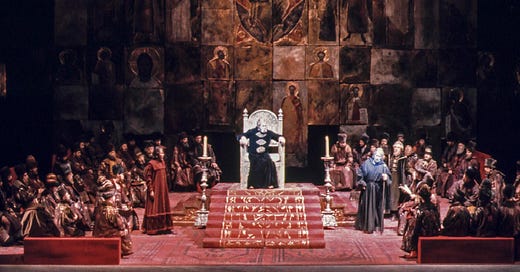“How long are the intermissions at the Richard M. Nixon Center for the Performing Arts?” asked Beatrice.
“I don’t know,” said Susan, “But I know a man who would know exactly – Fritjof Roper-Schell. Have I ever told you about Fritjof Roper-Schell?”
“I don’t think so,” said Beatrice.
Beatrice began to smile. She knew a story was coming.
“Then,” said Susan, “I will have to tell you the strange and wonderful story of Mr. Fritjof Roper-Schell, who was an acquaintance of mine when I was a young woman and moved in different circles.
“Now, Fritjof was a man who went to the opera often, but – you see – only for the intermissions. Of course, he used to go to the opera like anyone else, but he said he realized one day that he really got all he needed from the intermissions. At an intermission, he explained early on, one could hear about the highlights from the preceding acts, the costumes, whether a new soprano acquitted herself well, and so on.
“However, after he had been doing this for a year or so, he began telling me and his other friends that what people said during an intermission about an opera was far less important than what they did not say – or what they said besides. He could, he claimed, sense the quality and general nature of an opera simply from people’s casual remarks to one another, the tone of their breathing, and beyond that, the expressions on their faces and their deportment. Even the character and pallor of the people in the room were apparently very telling.
“After a period of three years, he began announcing that he had honed his craft even further. He could tell what opera was playing solely by the intermission and to that end he had even stopped buying tickets. You see – one of the charms of the Richard M. Nixon Center for the Performing Arts is that one need not have a ticket to attend an intermission. One can just stroll on in. There are always multiple performances going on in the center’s different halls and the lobby of the opera hall is not cordoned off from the network of corridors connecting the various entrances and other lobbies.
“So, he would just stroll on in without a ticket on days he knew an opera would be playing. And at the time intermissions usually were, he would wade through the intermission, make his judgement as to what opera was playing, write it down on a slip of paper, and when he got home, he would check his judgement against the calendar that the center used to send out to its donors in advance of every season.
“After three seasons, by means of this exercise, he claimed he no longer made mistakes concerning any of the operas in the standard repertoire. Concerning less well-known operas, he was at least always able to guess the composer. Wagner intermissions, he would say, often had purple-shadowed rooms with a metallic scent. Mozart intermissions skewed younger. Old men always chuckled more by the bar during performances of The Magic Flute, and so on. Indeed, he was so taken with his insights that he began to propagate a theory among his circle of friends.
“The theory was this:
Keep reading with a 7-day free trial
Subscribe to The Chained Muse to keep reading this post and get 7 days of free access to the full post archives.




